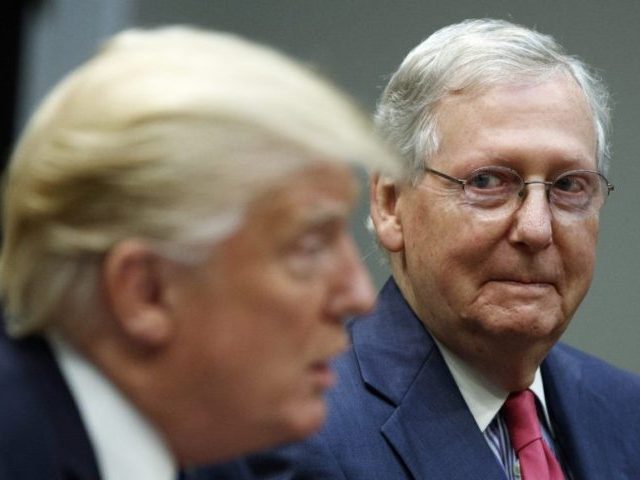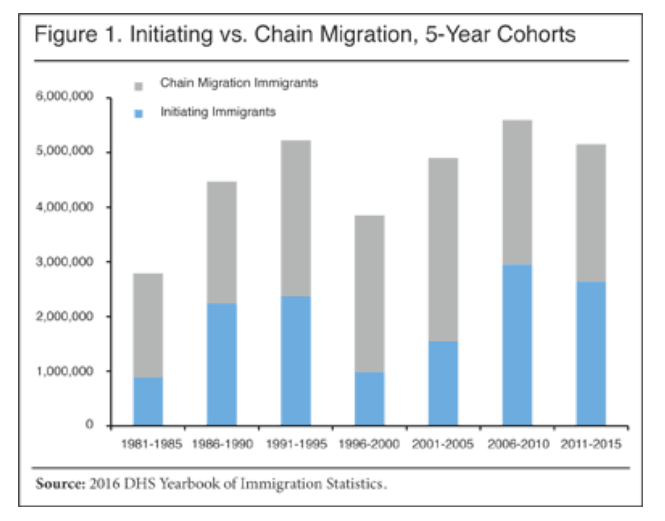Majority Leader Sen. Mitch McConnell has endorsed the Raise Act, which would raise Americans’ wages by halving annual immigration into the United States.
“I agree with [GOP Sen. Tom] Cotton and [GOP Sen. David] Perdue” who drafted the Raise Act, McConnell told Laura Ingraham on her Fox News show on November 29. “I think the kinds of things … that Cotton and Perdue are pushing are exactly what ought to be part of a solution,” he said, one year after Donald Trump’s shocking immigration-powered victory in November 2016.
“I think the mood on our caucus is that ending chain migration is a top priority,” Sen. Perdue told Breitbart News on November 30. “The majority leader’s statement … is a milestone,” he said, adding that “this is going to set America up to be competitive again with the rest of the world.”
The McConnell statement is “fantastic,” said Jessica Vaughan, policy director at the Center for Information Studies.
“It is a stunning development,” said Roy Beck, founder of the NumbersUSA immigration-reform group. He continued:
As far as I know, we’ve never had a Senate Majority Leader endorse the ending of chain migration. … The Republicans have had the opportunity for several years to become the party of wage-earners, and taking their side on immigration is the best way to signal to wage earners that they are on their side.
McConnell appeared to validate’s Trump’s emphasis on votes from employees, saying, “Clearly, immigration – the president made that a front and center issue.”
Still, McConnell’s endorsement of Cotton and Perdue’s Raise Act came with a few qualifiers. He also told Ingraham that he favors some form of amnesty for some illegals:
The president has actually given us an opportunity here by saying he wants to fix DACA, but he doesn’t want it all by itself. He wants something with it, and I think the kinds of things you and I are discussing that Cotton and Perdue are pushing are exactly what ought to be part of a solution.
Also, McConnell argued that immigration is important to the United States despite the changing economy and the rising civic conflict caused by the federal policy of imposing “diversity” on coherent American communities:
By the way, I’m sure you share my view that legal immigration is important. My wife, the secretary of transportation, came here at age eight not speaking a word of English. And legal immigration has been an important part of America for over 200 years, our entire existence. That doesn’t mean you just let anybody in at any point, and it doesn’t mean you tolerate illegal entries.
The Raise Act would cut annual immigration by roughly 45 percent by ending the “chain migration” of new citizens’ in-laws and siblings.
The Raise Act would permit new immigrants to only bring in their spouses and minor children. Under current law, new immigrants can also bring in their parents, siblings, and sibling’s spouses, who can then bring in their in-laws. In effect, today’s law allows yesterday’s immigrants to pick tomorrow’s immigrants, without screening for age, health, skills, ideology, or desire to assimilate.
Under current rules, every two new immigrants into the United States eventually brings in seven more legal immigrants, Vaughan said at a November 30 event organized by CIS.
The Raise Act would also end the visa lottery, which is intended to promote “diversity” by bringing in people with few cultural or ideological connections to the United States. Additionally, the act would expand the inflow of migrants with skills, aiding the economy and reducing marketplace pressure on blue-collar workers.
The Raise Act has already been endorsed by President Donald Trump, who is now pressing Democrats to accept the act and several other reforms in exchange for a form of amnesty for the 700,000 DACA beneficiaries or the larger population of three million “dreamer” illegals.
Industry lobbyists and their media allies are trying to derail the Raise Act by focusing public attention on the young illegals. These lobbies include the New American Economy group created by Mike Bloomberg and Rupert Murdoch, the FWD.us group created by Silicon Valley investors, including Mark Zuckerberg, and the National Immigration Forum, which is funded by the agriculture industry.
These lobbying groups favor immigration because it delivers a million additional consumers each year but also because it floods the labor market with new blue-collar and white-collar workers. The process was highlighted by a bakery in Chicago, which was forced to fire 800 illegal immigrants in its workforce and to then hire Americans at higher wages. The enforcement action cost cut revenue at the Cloverhill bakery by seven percent and trimmed profits from 16 percent to 9.5 percent of revenue.
But unfortunately for business, the reforms are very popular among voters.
Democrats embrace the industry-funded “nation of immigrants” polls that shame Americans to say they welcome migrants. But the alternative “fairness” polls show that voters put a much higher priority on helping their families, neighbors, and fellow nationals get decent jobs in a high-tech, high-immigration, low-wage economy. That political power of the voters’ fairness priority was made clear during the GOP primaries and again in November 2016.
Public support for a “dreamer” amnesty is also declining. Giving “children … protection from deportation” is the “top priority” for only 11 percent of American voters who identify as independents and “a top priority” for 23 percent of independents in a November poll by Morning Consult and Politico, which was headlined in “Polling Shows Waning Enthusiasm for Congressional Action on Dreamers.”
This voter’s pressure for pro-American reform has become more important for the senators as they head into the 2018 election, following the Democrats’ big win in Virginia’s off-year gubernatorial election. Also, the issue of ending chain migration is gathering approval from other senators, including two of the four GOP members of the “Gang of Eight.” Both Sen. Marco Rubio and Sen. Lindsey Graham have endorsed changes to the chain migration rules.
Each year, four million Americans turn 18 and begin looking for good jobs in the free market.
But the federal government inflates the supply of new labor by annually accepting one million new legal immigrants, by providing almost two million work-permits to foreigners, by providing work-visas to roughly 500,000 temporary workers, and doing little to block the employment of roughly eight million illegal immigrants.
The Washington-imposed economic policy of mass-immigration floods the market with foreign labor and spikes profits and Wall Street values by cutting salaries for manual and skilled labor offered by blue-collar and white-collar employees. It also encourages discrimination against American workers, drives up real estate prices, widens wealth gaps, reduces high-tech investment, increases state and local tax burdens, and hurts kids’ schools and college education. Furthermore, it pushes Americans away from high-tech careers and reduces the work activity rate below the rate in foreign rivals, which sidelines millions of marginalized Americans and their families, including many who are now struggling with opioid addictions.


COMMENTS
Please let us know if you're having issues with commenting.